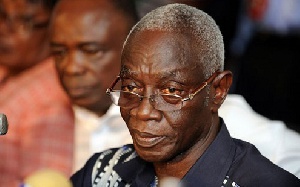The opposition New Patriotic Party (NPP) says some of the suggestions it made to the Electoral Reforms Committee formed by the Electoral Commission (EC) were rejected.
According to the NPP’s Committee on Elections, the Electoral Reforms Committee made up of the EC, some political parties and civil society organisations, was silent on a good number of its proposals, adding that it felt the proposals could enhance the integrity of general elections and deepen the country’s democracy.
The party made a tabular presentation yesterday comparing what they proposed and what the committee presented in its final draft report.
The EC committee had Mrs Georgina Opoku Amankwaa, Deputy Chairperson, EC; Mrs Rebecca Kabukie Adjalo, EC; Mr Asiedu Nketiah, NDC; Mr Kwabena Agyepong, NPP and Mr James Kwabena Bomfeh Jnr, CPP, as members.
The rest were Mr Anin-Kofi Addo, YPP; Dr Ransford Gyampo, IEA; Dr Kwesi Jonah, IDEG; and Dr Franklin Oduro, CDD-Ghana, with Mr Christian Owusu- Parry (EC) as Secretary.
Inaugurated on 23rd January, 2015, the committee was tasked to separate the proposals into categories such as those that required changes to regulations as well as proposals that required changes to existing administrative laws.
They were also to determine which proposals were worthy of adoption and indicate the form in which each change to be adopted was to be incorporated into the electoral system, bearing in mind its compatibility with the remaining aspects of the electoral laws.
The NPP said the committee was silent on the creation of a new voters’ register to replace the2012 register which they said was over bloated, adding, “we suggested that this register should be created not later than June 2016.”
They said they had suggested that the new register to be compiled “should be independently audited by an internationally reputable firm before the 2016 election.”
The committee said they suggested that copies of the new voters’ register should be provided to parties in both the electronic csv file and pdf file formats, but the committee was again silent on it in its report.
“The new register should be sorted alphabetically by last name and gender. The new register should clearly delineate voters registered overseas by country and basis for registration (e.g., mission, scholarship, etc),” they had suggested.
The party said they had also proposed that Regulation 1(4) be amended to read that a registered voter cannot guarantee more than two (2) potential registrants, saying, “Copies of such registrations should be made available to the political parties and should also be accessible by the general public.
“The statement of poll in each polling station must have a bar code reading to distinguish its unique features from any other. In the (C) section, C3 should be deleted and replaced with ‘What is the number of verified voters on the BVD at the close of the poll before counting of votes commences?’”
They suggested further that “the polling agents must be allowed to video record or photograph the pink sheet on completion before it is transmitted to the collation centre,” but the committee was again silent on it.
“High-quality carbonless paper must be used that allows multiple copies of the pink sheet to be distributed to the interested political parties, candidates and the pool of reporters,” they suggested.
They requested that every collation sheet must have a unique identification (serial number) and embossed with the polling station codes, polling station names and symbols of competing parties.
They said the summarised result declaration form for presidential and parliamentary elections is not backed by law and therefore must be discontinued, adding, “the conventional seventy-two (72) hours declaration of the presidential results is not backed by any legislation. We are proposing that it must be backed by law.”
The NPP recommended a back-up mechanism and equipment which allows verification of fingerprints in the event of equipment failure and said that at the close of voting, every Biometric Voting Device (BVD) must give a print out of the number of people who voted for the day.
They said the committee was silent on the call for the finger-printing system to be centrally networked to prevent any double or multiple registrations or voting in the entire country and that appropriate sanctions should be applied to defaulters.
“The EC should ensure that no third party systems are connected or linked to any of the EC’s own systems without the knowledge and active involvement of the political parties.”
There should be a provision on the statement of poll to be signed by a deputy Presiding Officer in the absence of the Presiding Officer, they added.
Politics of Thursday, 30 April 2015
Source: Daily Guide
EC Committee silent on new voters’ register
Entertainment












